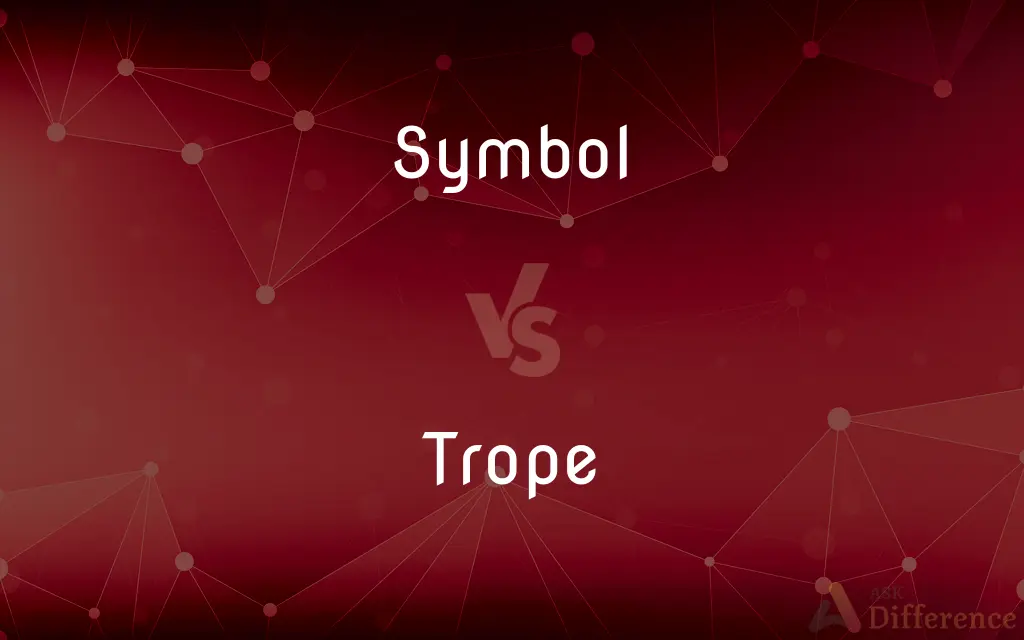Symbol vs. Trope — What's the Difference?

Difference Between Symbol and Trope
ADVERTISEMENT
Compare with Definitions
Symbol
A symbol is a mark, sign, or word that indicates, signifies, or is understood as representing an idea, object, or relationship. Symbols allow people to go beyond what is known or seen by creating linkages between otherwise very different concepts and experiences.
Trope
A figurative or metaphorical use of a word or expression
My sense that philosophy has become barren is a recurrent trope of modern philosophy
Perhaps it is a mistake to use tropes and parallels in this eminently unpoetic age
Both clothes and illness became tropes for new attitudes toward the self
Symbol
A mark or character used as a conventional representation of an object, function, or process, e.g. the letter or letters standing for a chemical element or a character in musical notation
The chemical symbol for helium is He
The symbol r in Figure 5 represents a gene which is ineffective
Trope
A figure of speech using words in nonliteral ways, such as a metaphor.
Symbol
A thing that represents or stands for something else, especially a material object representing something abstract
The limousine was another symbol of his wealth and authority
ADVERTISEMENT
Trope
A word or phrase interpolated as an embellishment in the sung parts of certain medieval liturgies.
Symbol
Symbolize.
Trope
A theme, motif, plot, or literary device that commonly recurs within a genre or work of fiction, especially when considered clichéd
“Finding the corrosion under the waxed-and-polished chassis of small-town America is itself an old trope” (James Poniewozik).
Symbol
Something that represents something else by association, resemblance, or convention, especially a material object used to represent something invisible
The lamb is a symbol of innocence.
Trope
An often recurring idea or image
“In our conversations, there was a running theme, a trope, of economic havoc, of drowned cities, of time running out” (Jon Gertner).
Symbol
An instance that typifies a broader pattern or situation
His striking out to end the rally was a symbol of everything that had gone wrong with the team over the past month.
Trope
Something recurring across a genre or type of art or literature, such as the ‘mad scientist’ of horror movies or the use of the phrase ‘once upon a time’ as an introduction to fairy tales; a motif.
Symbol
A printed or written sign used to represent an operation, element, quantity, quality, or relation, as in mathematics or music.
Trope
(medieval Christianity) An addition (of dialogue, song, music, etc.) to a standard element of the liturgy, serving as an embellishment.
Symbol
(Psychology) An object or image that an individual unconsciously uses to represent repressed thoughts, feelings, or impulses
A phallic symbol.
Trope
(rhetoric) A figure of speech in which words or phrases are used with a nonliteral or figurative meaning, such as a metaphor.
Symbol
A character or glyph representing an idea, concept or object.
$ is the symbol for dollars in the US and some other countries.
Chinese people use word symbols for writing.
Trope
(geometry) Mathematical senses.
Symbol
A thing considered the embodiment of a concept or object.
The lion is the symbol of courage; the lamb is the symbol of meekness or patience.
Trope
A tangent space meeting a quartic surface in a conic.
Symbol
(linguistics) A type of noun whereby the form refers to the same entity independently of the context; a symbol arbitrarily denotes a referent. See also icon and index.
Trope
(archaic) The reciprocal of a node on a surface.
Symbol
A summary of a dogmatic statement of faith.
The Apostles, Nicene Creed and the confessional books of Protestantism, such as the Augsburg Confession of Lutheranism are considered symbols.
Trope
(music) Musical senses.
Symbol
(crystallography) The numerical expression which defines a plane's position relative to the assumed axes.
Trope
A short cadence at the end of the melody in some early music.
Symbol
(obsolete) That which is thrown into a common fund; hence, an appointed or accustomed duty.
Trope
A pair of complementary hexachords in twelve-tone technique.
Symbol
(obsolete) Share; allotment.
Trope
(Judaism) A cantillation pattern, or one of the marks that represents it.
Symbol
(programming) An internal identifier used by a debugger to relate parts of the compiled program to the corresponding names in the source code.
Trope
(philosophy) Philosophical senses.
Symbol
(telecommunications) A signalling event on a communications channel; a signal that cannot be further divided into meaningful information.
Trope
(Greek philosophy) Any of the ten arguments used in skepticism to refute dogmatism.
Symbol
To symbolize.
Trope
(metaphysics) A particular instance of a property (such as the specific redness of a rose), as contrasted with a universal.
Symbol
A visible sign or representation of an idea; anything which suggests an idea or quality, or another thing, as by resemblance or by convention; an emblem; a representation; a type; a figure; as, the lion is the symbol of courage; the lamb is the symbol of meekness or patience.
A symbol is a sign included in the idea which it represents, e. g., an actual part chosen to represent the whole, or a lower form or species used as the representative of a higher in the same kind.
Trope
(transitive) To use, or embellish something with, a trope.
Symbol
Any character used to represent a quantity, an operation, a relation, or an abbreviation.
Trope
(transitive) Senses relating chiefly to art or literature.
Symbol
An abstract or compendium of faith or doctrine; a creed, or a summary of the articles of religion.
Trope
To represent something figuratively or metaphorically, especially as a literary motif.
Symbol
That which is thrown into a common fund; hence, an appointed or accustomed duty.
They do their work in the days of peace . . . and come to pay their symbol in a war or in a plague.
Trope
To turn into, coin, or create a new trope.
Symbol
Share; allotment.
The persons who are to be judged . . . shall all appear to receive their symbol.
Trope
To analyse a work in terms of its literary tropes.
Symbol
An abbreviation standing for the name of an element and consisting of the initial letter of the Latin or New Latin name, or sometimes of the initial letter with a following one; as, C for carbon, Na for sodium (Natrium), Fe for iron (Ferrum), Sn for tin (Stannum), Sb for antimony (Stibium), etc. See the list of names and symbols under Element.
Trope
(intransitive) To think or write in terms of tropes.
Symbol
To symbolize.
Trope
The use of a word or expression in a different sense from that which properly belongs to it; the use of a word or expression as changed from the original signification to another, for the sake of giving life or emphasis to an idea; a figure of speech.
In his frequent, long, and tedious speeches, it has been said that a trope never passed his lips.
Symbol
An arbitrary sign (written or printed) that has acquired a conventional significance
Trope
Language used in a figurative or nonliteral sense
Symbol
Something visible that by association or convention represents something else that is invisible;
The eagle is a symbol of the United States
Share Your Discovery

Previous Comparison
Sweet vs. Spicy
Next Comparison
Depart vs. Part













































